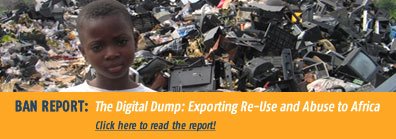You just bought a new computer and you thought it might be a good idea to give your old one to some association for re-use in a developing country (you own modest contribution to bridging the digital gap)?
So please READ THIS BEFORE.
This is a report published last week by the Basel Action Network (BAN), an international network of activists seeking to prevent the globalization of the toxic chemical crisis.
As BAN researchers found in Lagos (Nigeria), “almost all of the discarded imported electronic waste is thrown into formal or informal dumpsites, all of which are unlined, unmonitored, close to the groundwater and routinely set afire”.
“The dumped and burned electronic equipment contains toxic lead, cadmium, barium, beryllium, mercury, and brominated flame retardants, and some of these chemicals become more hazardous when burned”. The impacts on environment and health might be disastrous.
“Re-use is a good thing, bridging the digital divide is a good thing, but exporting loads of technotrash in the name of these lofty ideals and seriously damaging the environment and health of poor communities in developing countries is criminal,” said Jim Puckett, coordinator of BAN who led the field investigation.
Besides the public health and environmental issues, exporting used computers also raises some privacy concerns. Many of the hard drives recovered from computers in Lagos contained a great deal of confidential information, including performance management scores.
Donner son vieil ordinateur pour qu'il soit réutilisé dans un pays en voie de développement est en principe une bonne idée. Sauf qu'il finira sans doute dans une décharge d'Afrique ou de Chine, où il polluera et intoxiquera l'environnement.
Pour en savoir plus Lisez ce rapport édifiant du BAN (Basel Action Network).
dimanche 30 octobre 2005
The digital dump / la décharge numérique
Inscription à :
Publier les commentaires (Atom)
%40claire+Garate+-+Copie.jpg)





Aucun commentaire:
Enregistrer un commentaire